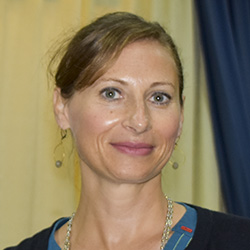How do you do a lot with a little? Look at Cuba
How do you do a lot with a little? Look at Cuba

Rebecca Seligman
Associate Professor, Anthropology
Following are excerpts of an interview with Associate Professor of Anthropology Rebecca Seligman on her recent academic visit to Cuba. Seligman was one of eight Northwestern representatives who traveled to Cuba this past summer to explore potential research collaborations.
What is your research interest?
I'm a medical anthropologist and a psychological anthropologist. My research focuses on how different social and cultural contexts affect mental health, in terms of people's minds and how their minds work. In particular, I'm intrigued in the ways that so-called “healthy” minds, as well as mental dysfunction or pathology, emerge in particular contexts in response to certain conditions.
What were your observations in Cuba in regards to the study and treatment of mental health?
Mental health cases seem to be very rare in Cuba, according to the Cuban doctors and researchers we met in June. It may be due to the socialist system, in which there is a lot less cause to be depressed and anxious, since its people know that they are going to be provided for at a certain basic level. Certainly, around the world, depression and anxiety in particular are highly correlated with lack of social and socioeconomic status. In many places, underprivileged people may be more depressed because their basic needs—healthcare, housing, food—are unmet.
As more and more economic inequality emerges in Cuba, with increased capital investment and entrepreneurial efforts—as is already happening―there are people who have and there are people who don't have. That kind of inequality tends to have a negative effect on mental health. It would be interesting to look at what happens, and whether Cuba maintains a socialized healthcare system in the same way it has—if their public health system acts as a buffer against negative mental health outcomes, or if inequality contributes to the emergence of more mental health problems.
Are there other health areas that you would be interested in researching with Cuban counterparts?
The issue of aging and healthy aging as a public health concern kept coming up in many of our meetings. Cuba is going through a demographic transition at the moment, with a very low birth rate and an aging population, and I sensed some anxiety about how they are going to care for this aging population.
I think there would be enthusiasm to do some collaborative research in a multilevel, cross-cultural project that looks at healthy aging in terms of both physical and mental health, in the U.S. and Cuba. In the U.S., the demographic transition has not been labeled a crisis right now, but we certainly have an aging population and need to create a context for healthy aging. I see opportunities in examining what Cubans are doing in their system and collaborating on ways to promote healthy aging through expansions or improvements in the systems of care for aging populations.
What kind of impact can our work and our presence in Cuba have?
I think it would be very worthwhile for Northwestern to have a flagship arrangement with a Cuban institution. Cuba is a really unique and interesting place to study, given its history of excellent health outcomes in an under-resourced environment. Meanwhile, at Northwestern, we have a very strong interest and institutional support for global health, which could make for some really interesting collaborative research along the lines of public health and health systems.
The level of research and medical knowledge in Cuba is really high, in a context where the medical system is thought about in a fundamentally different way than it is here in the U.S. We can learn a lot from Cuba about how their health system works, given the ways in which our systems are inadequate and don't work well, and about how to do global health better as well. How do you do a lot with a little? Cuba knows how to do that. The kinds of lessons that we could learn through collaboration with Cuban academics and medical researchers could then potentially be applied to other kinds of global health problems and contexts.